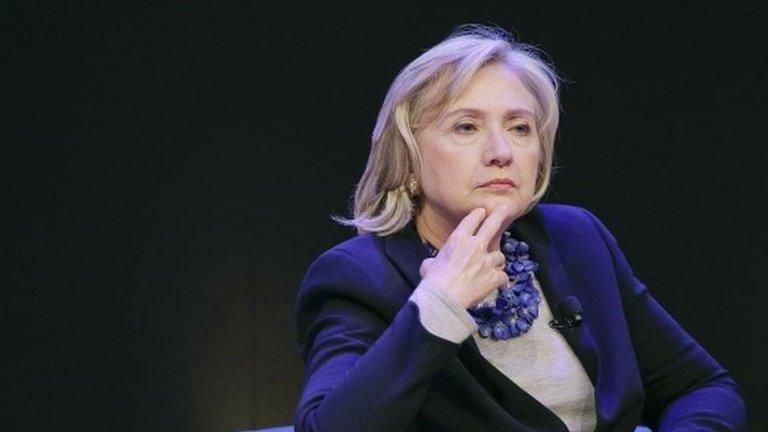Shattering the ‘highest, hardest’ glass ceiling
- Published
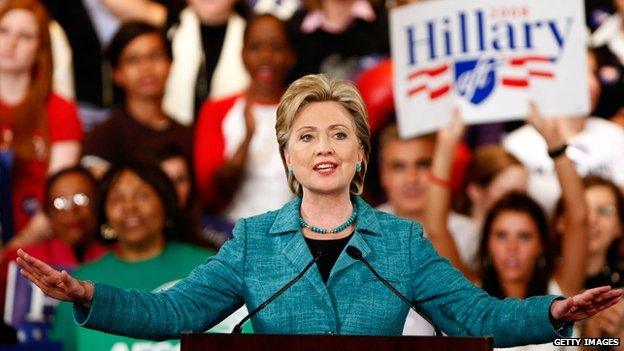
Will Clinton embark on the campaign trail again in 2016?
Hillary Clinton is tipped to run for US president in 2016. Throughout her career, she has used her positions to advocate for the rights of women around the world. Speaking to the BBC, three of the most powerful female leaders in recent history reflect on what has been achieved so far.
"I love [former US Secretary of State] Madeleine Albright's now very famous saying that there's a special place in hell reserved for women who don't help other women, because there's still so much work to be done," says Hillary Clinton.
As First Lady of the United States from 1993-2001 and former Secretary of State from 2009-2013, Clinton is conscious of her ongoing responsibility as a representative for women across the world.
"In the 21st Century the biggest piece of unfinished business is the full rights and opportunities for women and girls and that's what we should be focused on," she says.
Clinton also has unfinished business when it comes to the US presidency. In 2008 she was on the wrong side of history in her race for the Democratic presidential nomination, losing to Barack Obama.
"The idea of running to be president as a woman was such a leap of faith, and although some women had tried it in the past, nobody had gotten very far," says Clinton.
"I was the first woman to win any primary, and then went on to win a number of them and got almost more than 18 million votes."
Hillary Clinton: 'There were so many obstacles' as a woman
When Obama won the nomination, Clinton finally spoke out about the historical significance of ultimately seeing a woman at the White House in her 2008 concession speech:
"Although we weren't able to shatter that highest, hardest glass ceiling this time, thanks to you, it's got about 18 million cracks in it."
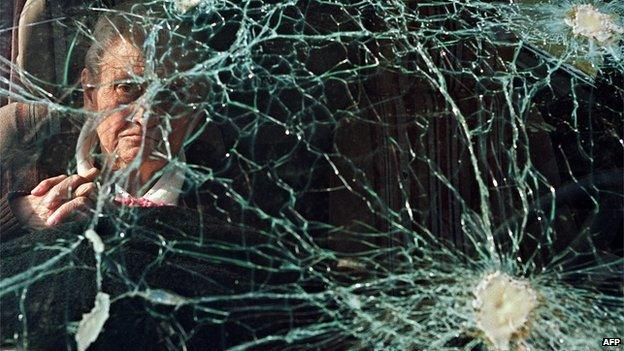
The treatment of women in war was brought to the world's attention in Clinton's speech in 1995
Cracks at the highest level only start to emerge when there is pressure and resistance at ground level. As First Lady Clinton set a challenge to the entire world to raise the profile of women's rights and female equality in every country when she spoke at the fourth international UN conference on women in Beijing in 1995.
Famously declaring that "women's rights are human rights", she discussed how these rights were violated every time a baby was drowned because she was born female. She talked of the brutality of female genital mutilation, sexual trafficking and how women's bodies had become the frontline of war, as rape increasingly became used as a tactic in battle.
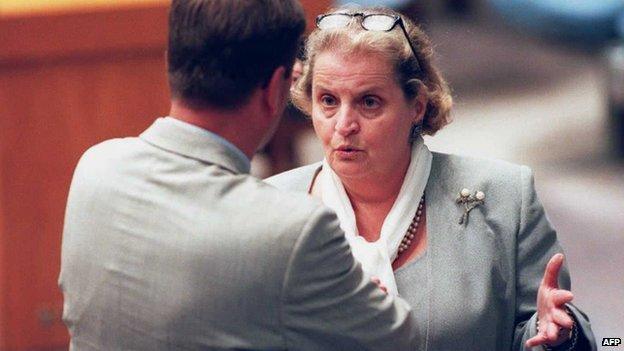
Madeleine Albright was a dominant force at the United Nations during her time as US ambassador
Madeleine Albright, appointed the US's first ever female Secretary of State in 1997, shared a similar agenda. Albright tackled women's rights during her time as ambassador to the UN from 1993-1997, but as one of only seven female permanent representatives, she came up against resistance when she brought attention to issues such as the suffering of women in the Bosnian conflict.
"I would go into meetings and talk about the importance of the support for Bosnia and a couple of the men around the table would say, 'don't be so emotional'," she says.
Condoleezza Rice says gender equality helps all people.
It was not until 2000 that Resolution 1325 was passed, acknowledging the role of women in war. It was the first UN resolution to ever specifically mention women and was followed by two UN resolutions stating that rape and sexual assault were war crimes.
As the second female Secretary of State serving from 2005-2009, Condoleezza Rice also advocated for women's rights. During the war in Afghanistan, she brought the Taliban's treatment of women to the world's attention and makes no apology to any critics.
"We were spending American blood and treasure to liberate the people of Afghanistan from one of the most brutal regimes on the face of the earth. That we would not use that moment to press for women's rights seems to me unthinkable. And so of course we were heavy-handed and heavy-footed about it, and yes it's a traditional society that had to come to terms with a 21st Century role for women."
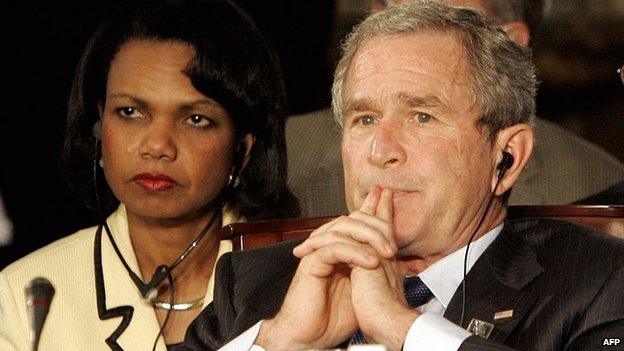
Condoleezza Rice was George Bush's National Security Advisor during his first term in office
As Secretary of State, Rice says she never encountered a situation in which she was treated differently as a woman.
"Frankly as Secretary of State if somebody treats you badly because you're a woman it's your fault not theirs," says Rice. "You have plenty of arrows in your quiver, and if you ever find that someone is questioning your authority then you should do what anyone does when their authority is questioned and you should either work it out with the person or you should fire them, and I did both."

Women in Power
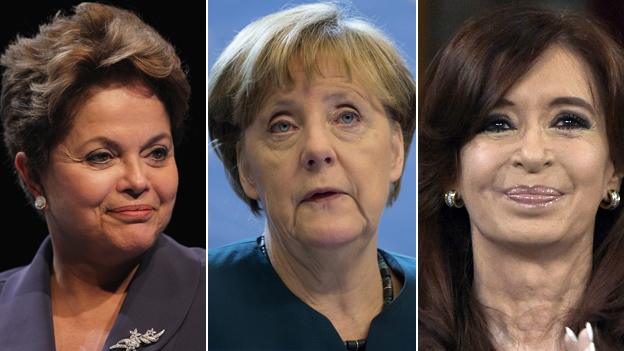
Leading the way - Dilma Rousseff, Angela Merkel and Cristina Fernandez de Kirchner
If Clinton is elected president she will enter a small club of women world leaders including:
Angela Merkel - Germany's first female Chancellor. Merkel was named the world's most powerful woman in 2014 by Forbes.
Cristina Fernandez de Kirchner - Argentina's first elected female President. She has been compared to the legendary Eva Peron.
Dilma Rousseff - Brazil's first female President. Rousseff has become famous for her public dressings-down of her ministers.

So what do these women feel has been achieved in recent times?
"I think what has been achieved since Beijing is at least a recognition that something has to be done," says Albright. "Now that doesn't seem like a big deal, but if you figure that we had gone through hundreds of years of women's issues being side issues or sentimental issues versus being issues that are central to foreign policy."
The growing number of women in positions of power in the developed and developing world is an encouraging sign, according to Rice.
In 2015, Albright told the BBC that society is more stable if women are politically empowered
"Women have been awakened in parts of the world where they hadn't been and they will fight for their rights," says Rice.
For Clinton, any progress made in relation to the rights of women has been slow.
"We still have so much more to do, and let's not be in anyway diverted, no matter what's happening in the world, we must continue on this agenda," she says.
Only time will tell if this agenda will also help launch Clinton into the White House, shattering the highest glass ceiling of them all.
Hillary Clinton: The Power of Women will be broadcast on Wednesday 25 March at 21:00 GMT on BBC Two. Or catch up later on BBC iPlayer.
- Published10 March 2015
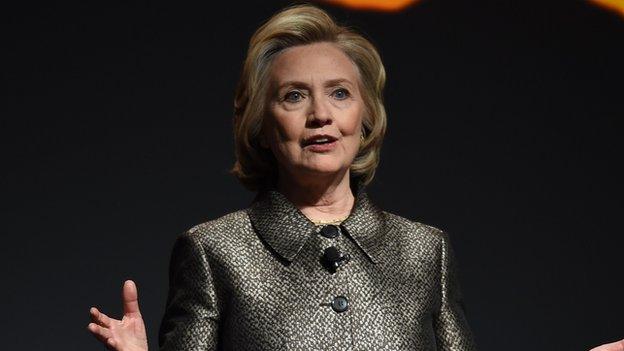
- Published17 March 2015
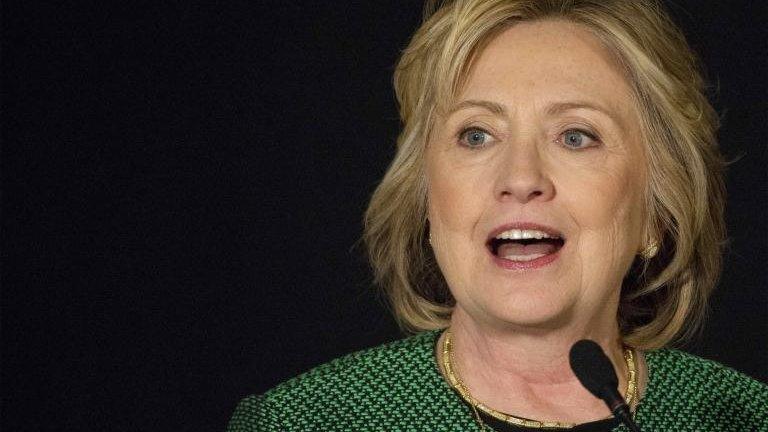
- Published1 February 2013
.jpg)
- Published20 September 2016
